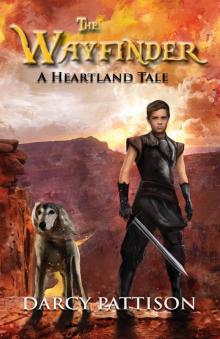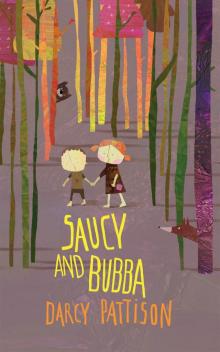- Home
- Darcy Pattison
Sirens Page 10
Sirens Read online
Page 10
16
Kidnapped
December 24
The next morning, a little before 9 a.m., Jake walked through the adjoining doorway into his mother’s room and interrupted a lively conversation. He was yawning, but he was finally getting used to the time zone change from Seattle. His stomach was already growling. He’d already packed his waterproof backpack with headphones and music. He was ready in case the discussion turned boring.
David sat on the edge of a hard chair drinking from a tiny espresso cup, while Colonel Barbena and Colonel Lett paced in front of the large windows overlooking Edinburgh. His mother sat calmly at a small desk clicking on something on her computer screen.
David was saying, “Jillian wants to see the changing of the guard and do all the touristy things in London.”
Colonel Barbena scowled. “You can’t be serious. It might seem like an innocent brunch, but—”
Arms crossed in anger, Colonel Lett put in, “—it could be a trap.”
Mother waved to Jake to come in and said, “They are trying to decide what to do today while we are guests of Captain Bulmer.”
Captain Barbena turned to him, “We need to go London to check security for the Ambassador to move there tomorrow.”
“Which is why,” Mom said, “you should both run down to London this morning. Come back late tonight or early tomorrow. Captain Bulmer is a good man. He helped us with the diver who was in trouble, and he’s the sort that seems trustworthy.”
“Seems,” Colonel Lett said scornfully.
“Jillian and I want to go to London for the day, too,” David added. He motioned for Jake to try some of the espresso. “We’ll do the tourist thing in London so Jillian can get pics for social media. What would we do here but wait around till you’re not busy?”
“You should let them go, Mom,” Jake said. He stretched his arms high, which made him realize that his stomach wound was even better today. Barely a twinge. He poured espresso and took a piece of dry toast. “We’ll be fine by ourselves for twelve hours. Right?”
Mom shut her computer’s lid and nodded. “Fine. You four go to London. Jake and I will be here when you get back. And David?”
“Yes, ma’am?”
“Make sure Jillian doesn’t post anything questionable. I’ll trust your discretion,” Mom said.
That brought a series of laughs from everyone. Jillian was so unpredictable. Mostly her photos evoked a sense of drama, but sometimes she ran off into melodrama. It would be like her to try to stage a set of photos in London about the Phantom of the Opera. Or maybe Jack the Ripper.
There came a rapid knock on the room’s door. The guards and David quietly left by exiting into the adjoining room. They were all drilled in discretion and knew that they needed to be unseen. Jake gulped his espresso and crammed the toast in his mouth before he opened the door.
Bulmer—out of uniform, dressed in jeans and corduroy jacket—nodded pleasantly and asked, “Are you ready for a great Scottish brunch? Are you hungry?”
“Mmm,” mumbled Jake through his mouthful of toast.
“Ready,” Mom said.
Jake grabbed his backpack. They pulled on jackets and followed the captain downstairs, and through the hotel lobby to a waiting white van. Bulmer opened the passenger door for Mom and ushered her inside. Two men with military haircuts already sat in back. Jake hesitated, uncertain, at the door. The men looked like soldiers and the driver looked military, too. Were they wrong to trust Captain Bulmer?
Bulmer waved at the two in back and said, “My friends, Syd and Les.” He nodded toward the driver. “That’s Edmund Frisk, the driver and our esteemed cook for the day.”
Mom was already buckling her seat belt, so Jake reluctantly climbed in. As the van pulled into the heavy traffic around their hotel, Jake asked, “Where are we going for brunch? You didn’t say.”
Bulmer didn’t answer, instead waving at a taxi that cut in front of them. Edmund, the driver, broke into a rapid curse, talking rapidly in a deep Scottish accent that Jake barely understood.
Mom and Jake looked at each other and shrugged. They’d find out soon enough. The toast hadn’t been nearly enough, though, and Jake’s stomach was rumbling.
Watching the road told Jake almost nothing since he knew so little of Edinburgh. He was surprised when they pulled up at a marina and stopped.
Bulmer opened the door and bowed, “This way, Ambassador.”
Jake and Mom climbed out.
“Where are we going, Captain?” Mom looked up at him disapprovingly.
“Sailing! Of course. I’m a Navy man and I’ve got this private sailing boat, Ruby. Edmund Frisk is a great cook and he’ll be serving us.”
Mom stopped short and put her hands on her hips in a gesture of defiance. “Am I being a fool to go with you?” she asked bluntly.
Jake gave her credit: she surprised the Captain.
“You are quite perceptive, Ambassador. This isn’t quite what it seems. But you can trust me that this is something you want to do. More than that, I cannot say.”
Mom prided herself on being a good judge of character, so Jake waited. She looked Captain Bulmer up and down. To his credit, he didn’t flinch away from her gaze.
Jake almost wanted to laugh at the image of his tiny mother defiantly weighing the characters of these burly men.
She turned to the three men—their escorts, or their guards, depending on your viewpoint. She gazed at them, as well, and no one turned aside.
“Will we be back by 4p.m. to meet with my staff?” she asked.
Bulmer cleared his throat. “Not likely.”
“This is important?” she asked, then answered her own question. “Of course, it’s important if you’re kidnapping us.”
Jake gulped at her words, but held steady beside her, not allowing himself to flinch or naysay her comments in any way.
Bulmer merely nodded, his eyes lighting with a newfound respect.
“Very well,” she said to Bulmer. “We will accompany you.” She turned to other men. “And Mister Frisk?”
He stepped forward. “Yes, ma’am?””
“We expect an excellent Christmas brunch. I take my tea with cream and sugar, please. And my son is famished. As usual.”
Leaving the men gaping, she turned and strode to the boat. With her head high, she allowed Bulmer to give her a hand as she stepped onto Ruby. The wind gusted suddenly and her curls blew in her face. With misgivings, Jake followed her. The last time they boarded a vessel together, it was Puentes’s yacht, and that hadn’t gone well. He was grateful for the knife on his back and for the one strapped to his leg.
17
Aberforth Hills
December 24
Ruby skimmed over the waves, her sails singing. A north wind blew cold, but Mom and Jake were sheltered behind a screen, with blankets available as they wished.
Edmund Frisk proved to be more than a capable cook in the tiny galley. He brought up a tray of steaming tea with cream, sugar, and scones, followed by bowls of Scottish oatmeal with brown sugar and raisins as toppings. Jake ate three bowls and only stopped because he didn’t want to appear rude. Mom seemed to be perfectly at ease, but as the morning wore on, Jake worried. Ruby was heading far out to sea.
He went to the head—the bathroom of the boat—where he had some small measure of privacy, and pulled out his cell phone to check the GPS app. As he suspected, they were heading in the direction of Aberforth Hills, the underwater city they had seen before. Good. Maybe he’d get some answers.
Finally, about noon, Ruby slowed, and Captain Bulmer dropped sails.
“Where are we?” Mom asked. “Will someone join us here?”
“We’re going swimming,” Bulmer answered. “We’ll need to put on our scuba gear. Do you want a wet suit or not?”
Mom rolled her eyes. “It would’ve been nice to know that I’d be swimming. I would have worn a swim suit.”
She had just had custom-made a long-sleeved swimsuit with t
he arm-pits cut out so her gills would have access to the water. She’d been anxious to try it.
“We took the liberty of buying you a new suit,” Bulmer said apologetically. He held up a black suit identical to the one she had bought.
So, Jake thought, they’ve been following every move we make. He took an uncertain breath. Who were these people? Why had they monitored them so closely? None of this sounded good.
Bulmer also handed Jake a bundle with a swim suit and wet suit vest. Taking it, Jake’s hands shook with worry.
The captain stepped aside to allow the Risonians to go below deck to change clothes.
Downstairs, Jake whispered, “We’re at Aberforth Hills, the underwater city. We’ll get to see it.”
Mom nodded soberly, “We’ll meet whoever lives there. And I think we’re in for a surprise.”
A few minutes later, they joined Bulmer and his men. They would leave only Edmund Frisk to man the sailboat.
They dove. Cold hit Jake for a few moments until his magma-sapiens blood took over and the temperature seemed normal. Bulmer and his troops all wore headlights, but the streams of light barely penetrated ten feet ahead. He kept Mom in sight, lest there was another trap planned. But Bulmer and his crew just kicked deeper and deeper until—
The light from Aberforth Hills started in a slow, gentle, distant glow. Soon, however, Bulmer and his crew turned off their headlights and swam directly for the light. Jake watched Mom and tried to see it from her point of view. She’d been raised in an underwater city on Rison, and when she took Jake for visits with his grandparents, he’d been able to explore some. The anatomical differences between Risonians and these Phoke, or whatever they called themselves, was obvious in the architecture and the city.
Risonian buildings had windows and doors that were open to the sea, like cottages on the windblown Scottish shore might open their windows to let in a sea breeze. The buildings in front of them now were a mass of walls, with few windows except on the newest-looking buildings. Risonians truly lived in the sea, with the currents sweeping through city streets to cleanse them of debris. Homes could be shuttered against storms, but usually they were filled with water and open to the currents.
This was a Mer city, or a Phoke city, if you liked the modern term. From the gossip he’d picked up, the Phoke had to breathe air every 30 minutes or so. They needed airtight buildings and pumps to bring air down, or air convertors of some kind.
The oldest buildings—those covered in barnacles and crabs—were shaped like a bell. Often there was a red arrow pointing down, which Jake guessed was a universal symbol pinpointing a moon pool entrance, such as they had on the Seastead in Puget Sound. The newest buildings were connected by a series of tubes, apparently pumped full of air—probably an expensive and difficult matter. Inside the tunnels, figures scurried back and forth.
The city was immense. Jake was hard pressed to even guess its population.
Bulmer motioned them toward a hill and they swam upward to reach the bottom floor of a massive structure that seemed like it was four or five stories tall. This was one of the seven fabled hills of Aberforth Hills, and atop it was an important building. A large tunnel led into the building. Bulmer swam under the tunnel following a red arrow, and a moment later, they saw his form emerge inside the tunnel.
Jake and Mom raised eyebrows at each other, but they followed Bulmer to enter the moon pool. Near the tunnel’s entrance was a stack of chamois cloths that they used to dry off, and then placed the wet towels in a basket. Presumably, they would be laundered and returned here at some point. Bulmer pulled off a waterproof backpack and pulled out t-shirts for each of the men and a longer t-shirt dress for mom. They donned them over their swim suits or wet suits. Apparently, it was okay to appear in such garb in polite Phoke society. Finally, he handed around flip-flops, the correct size, of course.
Nearby, a golf cart zipped by. Jake had no idea how it hovered about half a foot above the ground, or how it built up such speed. Obviously, the Phoke had advanced science and engineering skills.
“Where are we?” Mom asked Captain Bulmer.
Her voice was funny, high pitched. Jake realized that the tunnels were full of Tri-Mix gas, not just surface air. Because it included helium as one of the three gases, everyone would sound like a cartoon character.
“Ambassador Quad-de, may I be the first to welcome you to Aberforth Hills. We are taking you to meet the ruling council of the Phoke and to attend their first ever press conference.”
The funny voice almost made it sound like a comedy routine. But Jake was sure that this was deadly serious.
18
Flash Mob
December 24
London on Christmas Eve had been, as they say, brilliant. For Jillian, David and the Risonian officers, Christmas decorations gave the dreary day a cheerfulness it lacked on any other winter day. Jillian was happy when they dropped her at a shopping center with Colonel Barbena in tow, while David and Colonel Lett did an architecture tour. The shops were cheerful and rang with Christmas songs in that wonderful British accent. Jillian bought small gifts for everyone.
When they all met up again, the bodyguards left David and Jillian at the Tower Museum while the Colonels went to the Ambassador’s hotel and planned security for their stay.
Finally, they all went to Buckingham Palace to watch the “pomp and circumstance” of the changing of the guard.
Wind blew briskly, making Jillian pull up her hood. Buckingham Palace was stately in the background. She was disappointed that no one was allowed inside the massive black-iron gate with its imposing gold crest. Rows of soldiers stood at attention wearing red jackets, black pants and the crazy-big fuzzy-hats.
Jillian punched David. “Wish I could see you in one of those!”
He just laughed.
It was a good day, she thought. They’d been more relaxed without Jake and the Ambassador along. London was amazing, and she was already planning how to talk her mother into vacationing here next summer.
Most soldiers carried band instruments, with the trombones on the front row where their long slides wouldn’t hit the person in front of them. The guards’ wind-chapped cheeks were almost as red as their uniforms.
As usual, a crowd gathered to watch the changing of the guards. Jillian snapped photos with her smart phone, pausing only to upload to one or another of her social media channels. The crowd was kept off the road behind a fence. Crowd control guards wore black vests over heavy jackets, but even with all that on, they looked cold.
The band marched until it exited the palace gates. The drum major signaled, and the band lifted instruments to play its first song, a lively march. The step was odd. After each step, the soldier held his foot above the ground in a sort of stutter step, stretching out the march steps.
Suddenly, something rolled from the crowd toward the soldiers.
Jillian had to stand on tiptoe to see it: a blue ball.
One trombonist almost tripped avoiding the ball and had to run a step to catch up with the front line.
Another blue ball spun past a guard into the band’s path.
These two started a trickle of blue balls spinning from somewhere in the crowd toward the marching soldier.
Jillian raised her camera phone and started videotaping.
A dozen blue balls bounced toward the marching guardsmen. And another dozen.
It was impossible to see who was rolling the balls onto the street. No one. Everyone.
She scanned her phone to photograph the crowd. An old white-haired man pulled a ball from a deep coat pocket. A small woman in a nurse’s scrubs reached inside her purse for a ball. Balls bounced, rolled and clanged against each other and around the guardsmen’s feet.
The band stalled, and the drum major marched on alone, oblivious to the destruction of the carefully planned march.
Jillian’s face lit up with understanding. “A flash mob!”
The ground around the guardsmen’s feet was dangerously clu
ttered with balls. A saxophonist kicked at the balls trying to clear a spot, but only kicked the balls into his friends. No one could move without tripping.
Then a man stepped forward. Quickly, Jillian turned her phone camera toward him. He was nondescript. An average height man with average brown hair and average clothing—jeans and a black jacket.
In a clear voice, he called, “Blue balls because Earth is a blue planet. Earth is for Earthlings, not for Risonians.”
The crowd took up the chant, “Earth is for Earthlings.”
Jillian’s breath caught in a sharp pain: these people were protesting against Rison. She knew it happened, but had never seen it, never been in such a situation.
By now the Drum Major realized what had happened, and the black-vested guards looked at each other, trying to decide what to do.
The chant lasted less than a minute, before people turned and walked away.
The guards could do nothing but watch them leave. They hadn’t actually thrown balls at the guard. They hadn’t hurt anyone. If you asked one person about it, they’d just say their ball accidentally fell onto the street.
Mostly, people left with a smile. The flash mob had won the day.
David pulled Jillian away, too. They walked briskly back to the car with their bodyguards on high alert.
“Why?” Jillian asked. Even to herself, her voice sounded forlorn. Earth is for Earthlings, the chant still echoed in her head. Risonians were going to die by the millions and Earthlings didn’t care.
“Should I post the video?” she asked David. She always posted on social media. Always. To even question that—the flash mob had shocked her to her core.
Bitterly, David nodded. There were bound to be lots of clips on the news and on social media, he explained. She might as well be the one with the scoop. It kept their cover intact.
There were so few Risonians on Earth right now. It was ironic, Jillian thought, that they’d been there to see the protest.

 When Kittens Go Viral
When Kittens Go Viral The Wayfinder
The Wayfinder Sirens
Sirens The Girl, the Gypsy & the Gargoyle
The Girl, the Gypsy & the Gargoyle Saucy and Bubba
Saucy and Bubba Longing for Normal
Longing for Normal Kell, the Alien
Kell, the Alien Sleepers
Sleepers Vagabonds
Vagabonds Sleepers (The Blue Planets World series Book 1)
Sleepers (The Blue Planets World series Book 1) Pilgrims (The Blue Planets World series Book 3)
Pilgrims (The Blue Planets World series Book 3) Pilgrims
Pilgrims Kell and the Horse Apple Parade
Kell and the Horse Apple Parade Sirens (The Blue Planets World series Book 2)
Sirens (The Blue Planets World series Book 2)